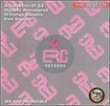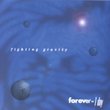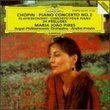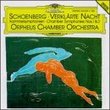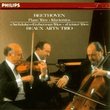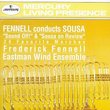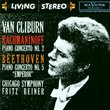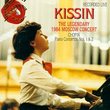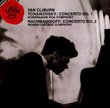| All Artists: Gaetano Donizetti, Richard Bonynge, National Philharmonic Orchestra, Joan Sutherland, Marilyn Horne, Giacomo Aragall, Ingvar Wixell, David Wilson-Johnson, Graeme Ewer, John Brocheler . Graham Clark Title: Donizetti - Lucrezia Borgia / Sutherland, NPO, Bonynge Members Wishing: 0 Total Copies: 0 Label: Decca (Universal) Original Release Date: 1/1/1989 Re-Release Date: 8/4/1989 Album Type: Import Genre: Classical Style: Opera & Classical Vocal Number of Discs: 2 SwapaCD Credits: 2 UPC: 028942149724 |
Search - Gaetano Donizetti, Richard Bonynge, National Philharmonic Orchestra :: Donizetti - Lucrezia Borgia / Sutherland, NPO, Bonynge
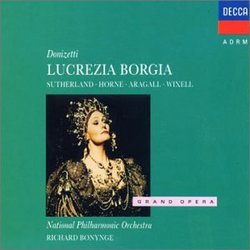 | Gaetano Donizetti, Richard Bonynge, National Philharmonic Orchestra Donizetti - Lucrezia Borgia / Sutherland, NPO, Bonynge Genre: Classical
|
Larger Image |
CD DetailsSimilar CDs
Similarly Requested CDs |
CD ReviewsA very dramatic opera and a dazzling recording! Ygor | Brazil | 07/09/2004 (5 out of 5 stars) "Lucrezia Borgia is one of the biggest challenges for a coloratura soprano, since it demands lots of vocal shades, dramatic skills and a big voice. It's one of those operas written for real dramatic coloratura sopranos. Perhaps that's why so few singers sang the part of Lucrezia successfully. Joan Sutherland, Montserrat Caball?, Leyla Gencer, Beverly Sills and, nowadays, Ren?e Fleming were exciting interpreters of that role, but nobody else excelled singing Lucrezia. All the other roles demand really good singers, particularly Maffio Orsini, a tricky part for the mezzo, and the lyric role of Gennaro. Lucrezia Borgia has some of the most amazing music composed by Gaetano Donizetti and a very involving plot.Joan Sutherland was still in her very peak when this recording was made. Her coloratura and her phrasing are breathtaking. She does a real show of bel canto singing and drama in her final cabaletta, "Era desso il figlio mio". If someone told you she was 51 years old then, you wouldn't believe! At 51 Sutherland is capable to sing incredible coloraturas and stunning high notes in a way that few or no singer could nowadays. Her perfect breath control allows her to sing some of the longest notes I have ever heard. For example, in "Maffio Orsini, signora, son io", she holds a note for 13 seconds (!!!). When she finishes and you start to think "She's not going be able to sing anymore!", she continues singing above the chorus and the orchestra! With a darker and more mature sound, Sutherland recorded this opera exactly when her voice was in its most ideal form to sing that dramatic role. Being Gennaro's mother and a cruel woman, all we need is a mature and heavy voice, and that's the case of Sutherland's. Her wonderful singing is aided by her intense and wise dramaticism. She gives us a cruel Lucrezia who can be at the same time a tender, hearted mother. When Lucrezia threatens her husband in the duet "Oh! a te bada", she's frightening. However, in her aria "Com'? bello" she sings with tenderness and nostalgia. But her greatest moment is the final scene, where Sutherland conveys all the drama that's necessary and shows an unforgettable performance. Marilyn Horne is the ideal Maffio Orsini. Her incredibly wide range goes from the lowest to the highest notes, and her coloratura is the best we could find at that time (she's far better than Shirley Verrett in Caball?'s recording, though Verrett is also a great artist). Besides, unlike some mezzos that sing Maffio Orsini, Horne can convince when she interprets a male role. Jaime Aragall has the right voice to Gennaro, and his interpretation really make us feel the loyalty and generosity that are associated to his role. He sings wonderfully Gennaro's aria, showing not only a beautiful voice but a great technique. Ingvar Wixell, in my opinion, is better suited to the role of Don Alfonso than many of the basses that we use to listen to. Some of his music demands high notes that basses can't fit. Thus, I think a lighter voice like Wixell's is the best choice. Richard Bontnge is always an intelligent and stylish conductor. In most of the operas he conducts, we got to know some orchestral nuances we simply don't notice in other recordings. His conducting is dramatic, heavy, fiery in this opera, and the orchestra creates a very convincing atmosphere. If we didn't have the correct atmosphere, we could find this opera not very interesting, because it really demands a whole dramatic atmosphere.I recommend this recording as the DEFINITIVE Lucrezia Borgia, because: 1) It's a complete recording (Sills's version has some cuts); 2) The sound is better than Caball?'s version, and far better than Gencer's live recording; 3) Sutherland's voice is the most ideal voice to sing Lucrezia and she's aided by the greatest coloratura mezzo at that time, Marilyn Horne; 4) The singers and the conductor managed to create a special atmosphere and an intensely dramatic interpretation.Enjoy this fantastic recording!" Viva The Diva: A Listening Pleasure M. Hall | 10/23/2003 (5 out of 5 stars) "Joan Sutherland was a beautiful Australian opera singer. Her voice is rich, full and big. Her husband conductor Richard Bonynge helped establish her as one of the reigning divas of the 60's and 70's. Together with sopranos Beverly Sills and Montserrat Caballe, Joan Sutherland provided much of the efforts in reviving bel canto operas, particularily those of Donizetti. Before the 60's, bel canto opera and especially Donizetti, was considered beautiful showcases for the singers, elegant ensembles and gorgeous vocals without any dramatic weight or without any real impressive fire. To an extent, this is true. The vocals in many of the soprano arias are very beautiful and pleasurable to hear. Light coloratura interpolated with legato, slow and restrained flowing lines. However, thanks to the efforts of the 60's songbirds Beverly Sills and Joan Sutherland the operas became a lot more. Finally, Donizetti got the recognition he deserved as a composer of dramatic operas.Although I personally feel that Beverly Sills did the most for reviving these operas and making them real powerful stuff as drama, Joan Sutherland served audiences as a reminder that bel canto is a listening pleasure. To watch her perform, Joan Sutherland did not always convince you in dramatic roles. Try as she would, she just did'nt put as much effort into her acting. If she had, she would have been exactly like Maria Callas who she was trying to emulate. She's been in many dramatic bel canto operas however - Lucia Di Lammermoor and Bellini's Norma. Her Norma has long been considered her signature role and her best and I agree. On recording, at least you get listening pleasure from hearing her voice, even if there is little to no acting.Lucrezia Borgia is in many ways Donizetti's more demanding works for a soprano. Other than Queen Elizabeth I in Roberto Devereux, the role of Lucrezia Borgia is classified as a highly challenging dramatic character to sing. Lucrezia must come off as scheming, evil and tempting. She is beautiful, vain, impetuous. Who knows how the historic Lucrezia Borgia was like. The Borgias, of course, were dubbed villainous and power-hungry in Renaissance Italy and it was Lucrezia's own relative Cesare Borgia who tainted her name by such accusations as adultery and poisoning her own son. In the opera, although Lucrezia is a fierce woman, she wants to re-connect with her estranged son. This is another side to her character, her lighter side, her motherly side. This is appropriately full for a character in opera, and especially in a diva role. If you've seen Roberto Devereux or heard it on recording, Queen Elizabeth is two sides of a coin- jealousy, rage and awesome majesty and soft romantic love-struck woman. The same goes for Lucrezia- she's both light and dark. This recording only showcases Joan Sutherland's beautiful singing voice. She is fine in some portions but she fails to convey drama and power in many other portions, especially the portions where she is required to be dramatic and to act. Thus, this is only a must have recording if you are a hardcore fan of Joan Sutherland. You may also see her in the DVD release of her live performance as Lucrezia Borgia. I feel she's giving a better performance on the live performance and not on this studio recording.Here's the best advice I can give you if you want to hear the best Lucrezia: Try to sample different sopranos other than Joan Sutherland who have sang Lucrezia- they are Montserrat Caballe (dramatic, powerful voice, beautiful legato and pianissimo) Beverly Sills (the best dramatic inflection, perfect legato, fantastic coloratura and my personal favorite Lucrezia. For Beverly's rare Lucrezia, which never made it into a recording, you have to buy the recording "Sillsiana" which features Beverly doing a number of bel canto arias including Lucrezia). Finally, for a recent, more updated soprano who has sang Lucrezia, listen to Renee Fleming, who has a recording of bel canto heroine arias. Her Lucrezia Borgia is excellent. Renee Fleming looks the part, is dramatic, convincing, and a mixture of beautiful voice and dark voice. But kudos to all the sopranos who have dared take on the role of Lucrezia, including Joan Sutherland." Giacomo Aragall , the greatest tenor? Mrs. A. V. Mackay Binnie | London UK | 07/22/2006 (5 out of 5 stars) "This recording of Lucretia Borgia is essential listening for the sheer beauty of Aragall's voice. A true tenor, unlike so many of the 'pushed up baritones'that we are forced to listen to,because of the rarity of singers with a high upper register or easy top.In this recording we hear Aragall at his peak and understand why Pavarotti has stated that he would have given everything for this voice. Domingo also says that this voice is the most beautiful. As Gennaro we are priviliged to hear such plangeant tones,colouring of the voice and those top notes ,always true and crystal clear. It is these gifts that have made him the tenor of choice by all lovers of the lyric art.Forget the overhyped Three Tenors ,listen to the real thing and begin a wonderful journey through his historical rscordings."
|

 Track Listings (35) - Disc #1
Track Listings (35) - Disc #1
